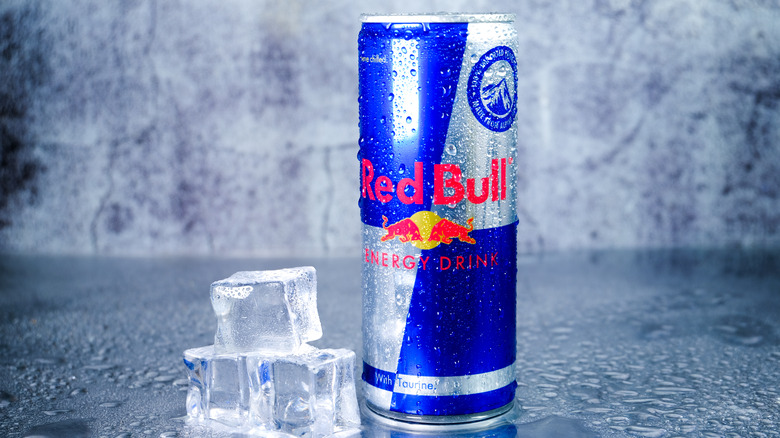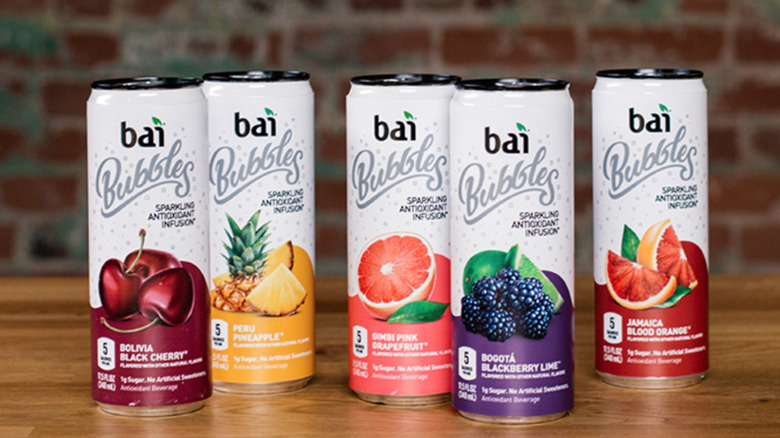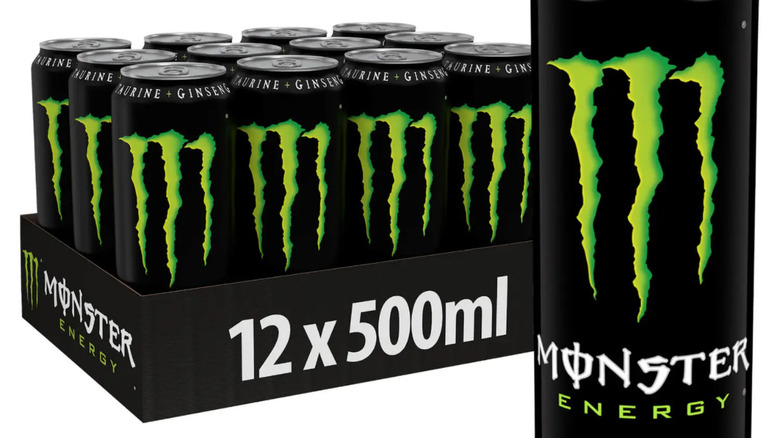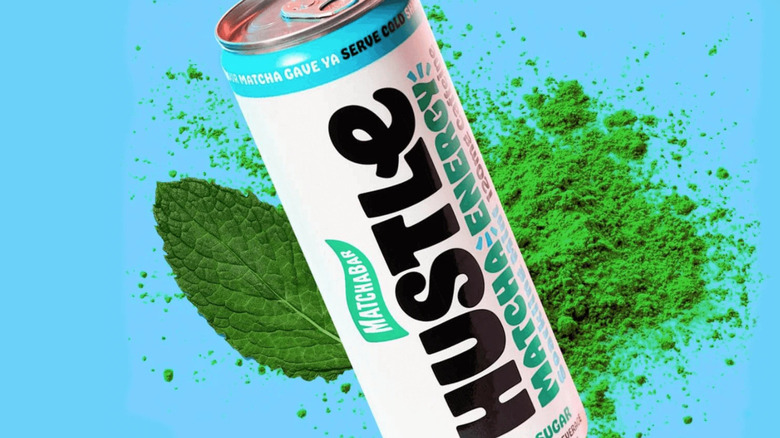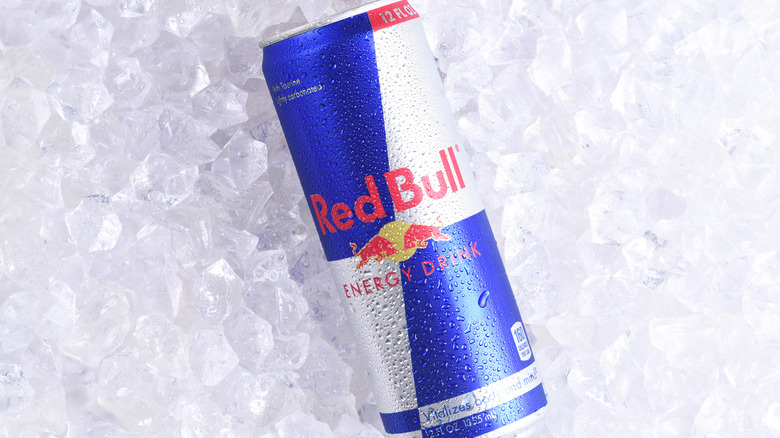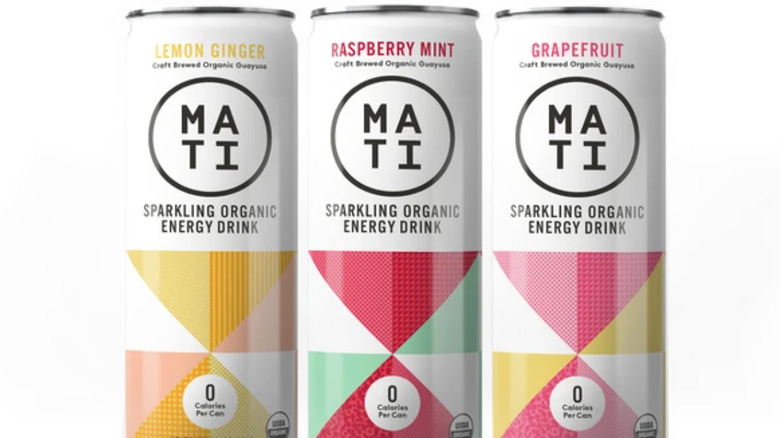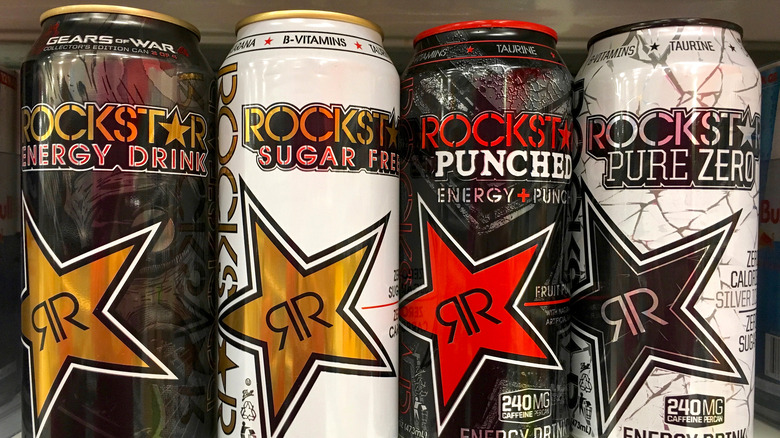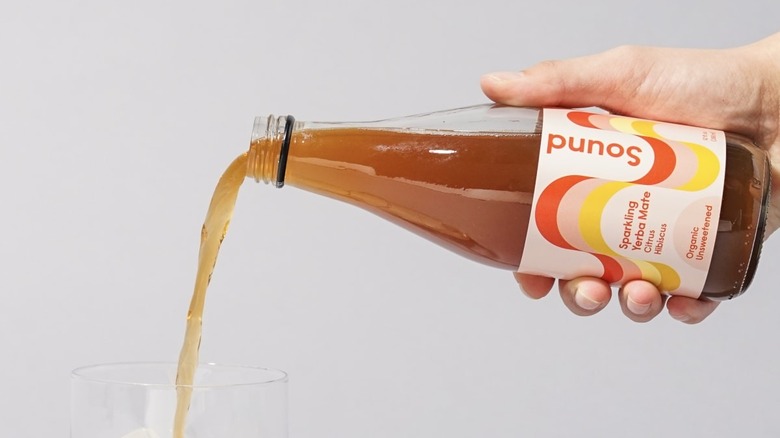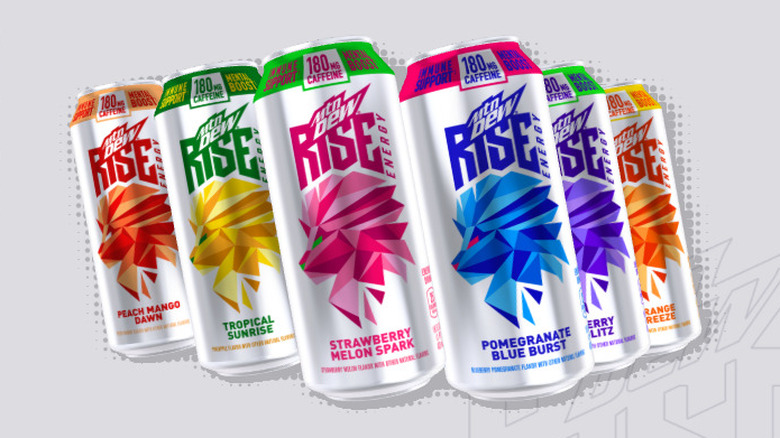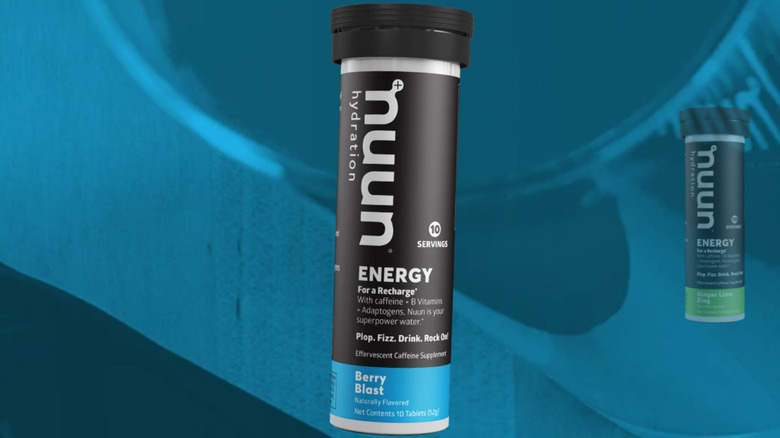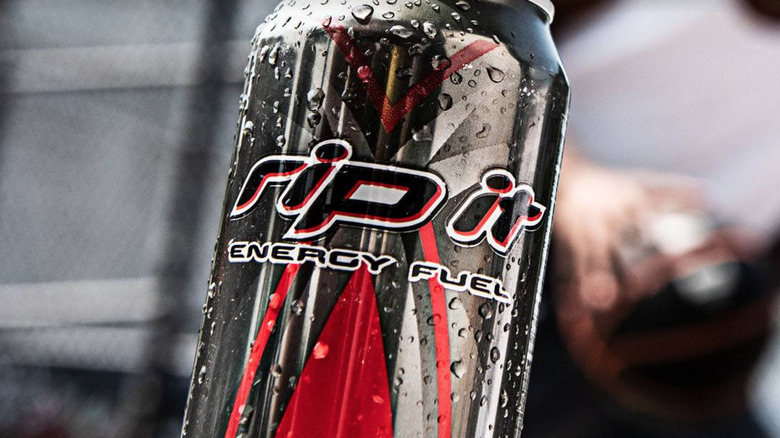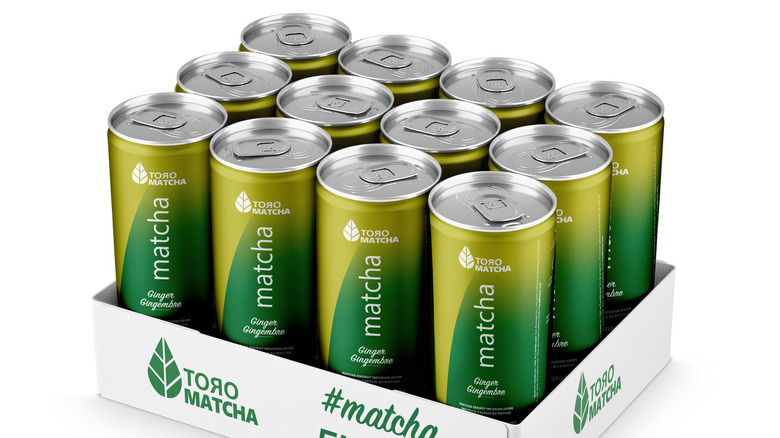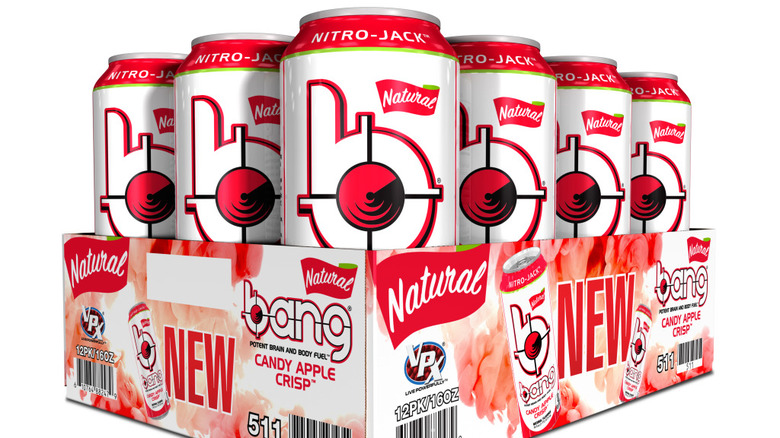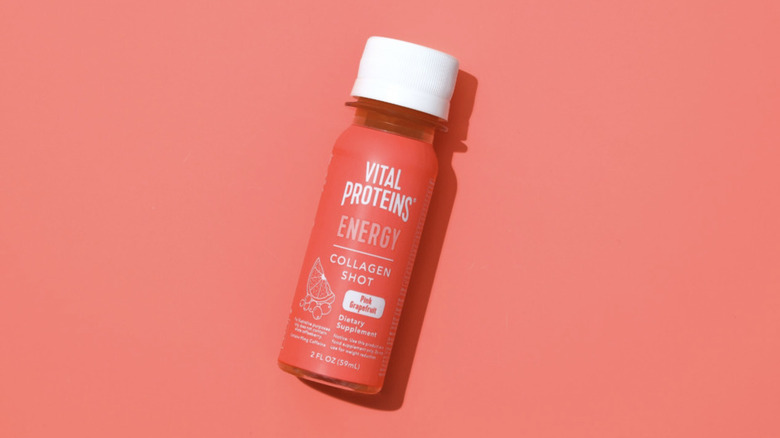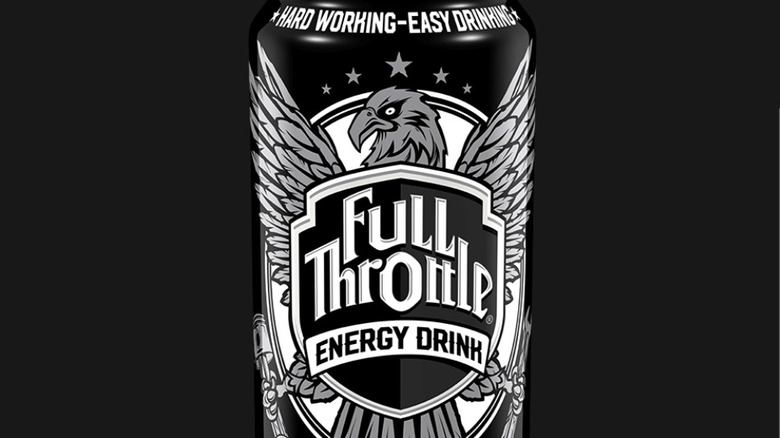The Best And Worst Energy Drinks For Your Health
Whether you're really feeling it from a long, hard week, or need a little something extra to power through a workout, grabbing an energy drink when you need a pick-me-up is something most people have done. The worldwide energy drink market has reached almost monstrous proportions, with a total value of over $134 billion in 2021 — almost $14 billion of which was spent in the U.S. alone (per Statista).
However, energy drinks have remained controversial pretty much since they went mainstream. With the astronomical levels of caffeine, sugar, and additives that some energy drinks can contain, drinking too many or too frequently can have some seriously unpleasant (and potentially dangerous) side effects, as Eat This, Not That highlights. It's important to remember, though, as Ohio State University Wexner Medical Center's primary care sports medicine physician Larry Nolan told U.S. News & World Report, "Any drink that contains a stimulant compound" is in effect an energy drink, and there are plenty of choices out there that are healthier than some others.
Best: Bai Bubbles Sparkling Antioxidant Infusion
Beverage company Bai seeks to "translate modern wellness trends into tasty drinks," according to its website. A glance at some of their Bubbles Antioxidant Infusion products' nutritional information confirms that they're putting their vision into practice. The Bolivia Black Cherry drink contains no artificial preservatives, just a single gram of sugar, a hefty dose of vitamin C, and a gentle amount of caffeine per serving (45mg, equivalent to a cup of green tea).
To add to this goodness, Bai also infuses their drinks with antioxidants in the form of chlorogenic acid and polyphenols (via Bai). Chlorogenic acid, which is found in coffee as well as other plant compounds, can provide a stimulant effect that's less harsh than coffee, and may provide health benefits around blood pressure and weight loss, according to Examine. Polyphenols, too, are found in many plant compounds and may have notable positive health effects, with evidence pointing toward benefits of reducing inflammation and blood pressure, and reducing the risk of developing type 2 diabetes, per Medical News Today.
If all that weren't enough, Bai believes their drinks are pretty good in cocktails, too, with their Bolivia Black Cherry being a key component in their "Very Berry Moscow Mule" recipe on their website. We respect the versatility of this drink!
Worst: Monster Energy
The monolithic Monster Energy brand might be one of the most well-known energy drinks out there, but let's be real –- just because it's popular doesn't always mean that something's good for you. Such is the case with Monster Energy drinks. Some nutritional aspects of these beverages make Monster far and away one of the unhealthier choices out there today, with one of their 24-ounce cans providing 27 grams of sugar (via InstaCart).
Monster Energy drinks also contain salt and a caffeine load of 160 milligrams per can, according to Caffeine Informer. The drinks also contain a host of further troublesome ingredients such as citric acid, which is guaranteed to give your dentist a headache, particularly in combination with Monster's high sugar load. "Imagine the collision of citric acid with sugars, and you have the perfect storm for tooth enamel demineralization and/or tooth decay," Anastasia Turchetta, a registered dental hygienist, told The Healthy. Enamel cannot grow back, and once it's gone, you face an increased risk of dental issues, as well as teeth that are way more yellow and stain-prone, says Turchetta.
Best: MatchaBar Hustle
MatchaBar Hustle harnesses the nutritional power of matcha, the antioxidant-rich powder derived from green tea leaves, to give it its energy-boosting effects. This helps to create an energy drink that's far healthier than most, with a super-clean nutritional profile composed of natural ingredients and 80 milligrams of caffeine per serving and no artificial additives, according to the product information for the Lemon Lime version of their Hustle Sparkling energy drink on Amazon.
MatchaBar's use of matcha means that it's also got an ample amount of the amino acid l-theanine in each serving (via Healthline). In addition to helping with increased focus, l-theanine may also help to reduce anxiety (probably pretty useful with an energy drink), as well as bearing potentially positive effects for maintaining a healthy immune system and safe blood pressure. Add to that the fact that this drink has zero sugar, and it could be an energy product worth your time and money.
Worst: Red Bull
Roughly a quarter of all people who buy energy drinks will opt for a can of Red Bull (per Statista). But the reason it is so wildly popular (energy!) is, unfortunately, also the reason why it's one of the unhealthier drinks you can choose.
It's no secret that the caffeine content of Red Bull is pretty high, at 80 milligrams in an 8.46-ounce can and 114 milligrams in a 12-ounce can, according to Caffeine Informer. It's worth pointing out that the FDA has advised that up to 400 milligrams of caffeine daily is safe. However, as clinical dietitian Jessica Mason told Eat This, Not That, "Increased intake of caffeine can lead to increased blood pressure and increased heart rate." Mason additionally states that drinking Red Bull frequently over time can lead to poorer heart health. To add to this, individuals more susceptible to the effects of caffeine — such as children and adolescents, pregnant people, and those with caffeine sensitivity — may be more susceptible to the effects of caffeine on the cardiovascular system, according to a review by the National Academy of Sciences. In short: Red Bull may give you wings, but it may also give you problems that you don't want.
Best: Mati Sparkling Organic Energy Drinks
As energy drinks go, it's hard to get a better nutritional profile than those offered in Mati's Sparkling Energy Drink range. Their simplest zero-calorie drinks contain no sugar, no sodium, no calories, and no diet sweeteners, according to their website. In fact, there's a total of four things on their ingredient list: organic lime juice concentrate, carbonated water, natural flavors, and brewed organic guayusa tea leaves, which is where the Mati line gets its energy kick from.
These leaves, which come from a holly tree found in the Amazon rainforest, are frequently consumed in tea form in Ecuador and other parts of South America, according to Verywell Health. And in addition to offering a caffeine boost that's potentially less extreme than coffee (due to a smaller release of epinephrine, or adrenaline, when drinking it), guayusa tea leaves are also a great source of antioxidant compounds and may bear potential health benefits, as a review published in Nutrients states.
Worst: Rockstar
Rockstar energy drinks may come with a super-cool name and a super-fast boost of energy, but that's pretty much where the positives end. When it comes to nutrition, these drinks are bad news, primarily due to their sugar content. As Open Food Facts shows, in addition to a number of additives, a standard Rockstar energy drink contains 31 grams of sugar per 240-milliliter serving. Considering that there are two servings per 480-milliliter can, and you're looking at 62 grams of sugar.
Now, you don't need to be a health guru to know that's a lot. Even if you stick to just a single serving (is there, like, a version of a champagne stopper for cans, we wonder?) that's a lot more than the 6 to 9 teaspoons of added sugars that the American Heart Association recommends as the upper daily limit for Americans. Keeping an eye on your added sugar intake is vital as excess consumption is linked to various health effects that can increase your risk of stroke or heart attack (per Harvard Health Publishing).
Best: Sound Sparkling Yerba Mate Organic Unsweetened
You might be used to your energy drinks in a can, but Sound's Sparkling Yerba Mate Organic Unsweetened drinks are mixing things up — both in presentation and nutrition. In a sleek glass bottle, Sound's Yerba Mate uses no natural sweeteners and delivers energy through a combination of white tea, green tea, and the namesake ingredient yerba mate, according to the brand's website.
A traditional herbal tea derived from the Ilex paraguariensis plant, native to South America, yerba mate contains caffeine and theobromine, giving it its stimulant effect (per Healthline). In addition to providing a less extreme caffeine boost than coffee, yerba mate is also rich in antioxidants such as polyphenols, as well as saponins — chemical compounds that can produce anti-inflammatory effects in the body (via Science Direct). Among the other potential health benefits of drinking yerba mate is a lowering of blood sugar and risk of heart disease, and helping to preserve your immune system, according to Healthline.
Worst: Mountain Dew Rise
Mountain Dew's energy drink line, Rise, is one of the least healthy products available on the market. On the surface, these drinks seem to be a better choice than other sugar-laden products, with just 4 grams of sugar in the 16-ounce cans, according to the nutritional information for Mountain Dew Rise Tropical Sunrise (via PepsiCo Beverage Facts). This is offset, however, by the wildly high caffeine level of the drink, an eye-watering 180 milligrams per serving.
It's also worth considering where the flavor and color of drinks come from, and with Mountain Dew Rise, the sources aren't great. According to Nicole Avena, the assistant professor of neuroscience at the Mount Sinai School of Medicine, Mountain Dew Rise "contains multiple artificial sweeteners (aspartame and sucralose) and colors (yellow 5)" (via Eat This, Not That). Avena pointed out that artificial coloring is of particular concern due to a potential research-based link between yellow 5 and hyperactivity in children.
Best: Nuun Energy
How do you stand out in an already crowded energy drink market? Nuun has found a way by creating Nuun Energy, an effervescent tablet that you drop into a glass of water to create an instant energy drink that delivers 80 milligrams of caffeine, according to the brand's website. Deriving its caffeine content from green tea, Nuun Energy also delivers a dose of electrolytes, a blend of vitamins B12 and B6, and 20mg Panax ginseng per serving.
Nuun's inclusion of ginseng taps into a longstanding use of the ancient herb for its potentially beneficial effects on health. While it's true that further research is needed on the efficacy of ginseng for health in a supplementary form, it could have benefits as wide-ranging as increasing energy, working as an anti-inflammatory, improving cognitive function, and helping to safeguard against infection, according to Medical News Today. B12 can provide boosts to energy and concentration, particularly in those who are deficient in the vitamin, says Healthline.
Worst: Rip It Power
With a name like "Rip It Power" you can expect this drink to provide a huge boost to your energy levels, and a glance at Rip It Power's nutritional information confirms this. Actually, it arguably provides a little too much, with a huge 51 grams of sugar per can, per Nutritionix. That's 102% of your daily recommended intake for a single serving, as the nutritional label points out. And that's before the sky-high 160 milligrams of caffeine you'll also ingest when drinking it.
If that wasn't enough to cause concern, registered dietitian and co-creator of the "Happy Eating Podcast" Brierley Horton named Rip It as the least healthy energy drink out there in an article for Eating Well. While Horton does point out that Rip It's caffeine content doesn't exceed the recommended limit, she also noted that there are way better choices out there for an energy boost –- like a simple black coffee.
Best: ToroMatcha Sparkling Ginger
Using organic Japanese Uji matcha as its caffeine source, ToroMatcha promises "hours of energy with no jitters and no crash," according to its website. This is in part thanks to its moderate caffeine content per serving, just 60 milligrams per can, as well as avoiding any blood sugar spikes (and subsequent crashes) due to the drink being sugar-free.
Additionally, the inclusion of organic ginger juice not only provides ToroMatcha Sparkling Ginger with a fresh taste, but it also means that it's providing a super-healthy ingredient with every sip. Chemical compounds present in ginger can help with preventing the growth of oral bacteria, combat nausea or a queasy stomach, and may potentially have anti-inflammatory effects, according to WebMD. However, it's important to remember that these effects are most evident when it comes to fresh ginger juice, and if you're looking for the most benefit from ginger, it may be better to make your own ginger shots, as Healthline suggests.
Worst: Natural Bang Energy Drinks
Natural Bang Energy Drinks, on the surface, look like a pretty good option for an energy boost, boasting no sugar and no artificial coloring according to their website. To add to this, the caffeine they use in their drinks is, as they point out, derived from actual coffee beans instead of produced synthetically. But the level of caffeine in their drinks? Well, it's ... a lot.
Natural Bang contains a daunting 250 milligrams of caffeine per 16-ounc can, way more than half of the upper recommended daily allowance outlined by the FDA. This is enough to give the assistant professor of neuroscience at Mount Sinai School of Medicine Nicola Avena pause (via Eat This, Not That). While Avena did reiterate a fairly positive view of its ingredients list and sugar-free nature, she asserted that the high caffeine levels in Natural Bang "can cause adverse side effects such as jitters, nausea, heart palpitations, and even vomiting," depending on how tolerant you are to caffeine.
Best: Vital Proteins Collagen Energy Shots
If you like your energy drinks with a bunch of added benefits, Vital Proteins Collagen Energy Shots might be the choice for you. This unique drink (promoted by none other than Jennifer Aniston on the Vital Proteins website) provides energy through a combination of caffeine and Alpha-GPC. However, where it really stands out from the crowd is through its inclusion of hyaluronic acid and collagen peptides to help maintain skin health. Collagen peptides, in particular, can be effective as a supplement to help combat skin aging, brittle nails, and osteoarthritis, according to WebMD.
Another interesting, and healthful, addition is the inclusion of electrolytes in the shot. In addition to helping to regulate fluid levels in the body and blood plasma, electrolytes also transmit nerve signals throughout your body and facilitate muscle contractions, aiding in proper energy function (per Roswell Park Comprehensive Cancer Center). Electrolytes also help to build new tissue, meaning that if you're looking for an energy boost pre- or post-workout, the Vital Proteins Collagen Energy Shot might be a solid option.
Worst: Full Throttle
This drink is Full Throttle in name and in nature — when it comes to ingredients, it seriously doesn't hold back. This energy drink contains a bevy of ingredients that push it into wildly unhealthy territory, the most obvious being its enormous sugar content, at 58 grams per serving for its citrus and blue agave flavors (per Full Throttle). The amount of sugar is so enormous, in fact, that registered dietitian Trista Best added the drink to the top of her "worst list" (via Eat This, Not That).
Not only that, but the sugar in the drink comes largely from high fructose corn syrup, an artificial sugar source that if consumed in excessive quantities can increase your likelihood of fatty liver disease, diabetes development, and inflammation, according to Healthline. Full Throttle also contains a pretty large 160 milligrams of caffeine per can, almost half of your recommended daily upper limit, according to the FDA, in addition to artificial flavors, preservatives, and colorings.

